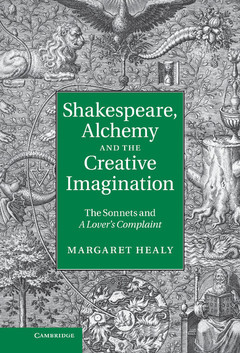Description
Shakespeare, Alchemy and the Creative Imagination
The Sonnets and A Lover's Complaint
Author: Healy Margaret
Healy demonstrates how Renaissance alchemy shaped Shakespeare's bawdy but spiritual sonnets, transforming our understanding of Shakespeare's art and beliefs.
Language: EnglishApproximative price 81.47 €
In Print (Delivery period: 14 days).
Add to cart
Shakespeare, Alchemy and the Creative Imagination
Publication date: 04-2011
Support: Print on demand
Publication date: 04-2011
Support: Print on demand
Approximative price 49.66 €
In Print (Delivery period: 14 days).
Add to cart
Shakespeare, Alchemy and the Creative Imagination
Publication date: 07-2014
Support: Print on demand
Publication date: 07-2014
Support: Print on demand
Description
/li>Contents
/li>Biography
/li>
Shakespeare's sonnets and A Lover's Complaint constitute a rich tapestry of rhetorical play about Renaissance love in all its guises. A significant strand of this spiritual alchemy is working the 'metal' of the mind through meditation on love, memory work and intense imagination. Healy demonstrates how this process of anguished soul work - construed as essential to inspired poetic making - is woven into these poems, accounting for their most enigmatic imagery and urgency of tone. The esoteric philosophy of late Renaissance Neoplatonic alchemy, which embraced bawdy sexual symbolism and was highly fashionable in European intellectual circles, facilitated Shakespeare's poetry. Arguing that Shakespeare's incorporation of alchemical textures throughout his late works is indicative of an artistic stance promoting religious toleration and unity, this book sets out a crucial new framework for interpreting the 1609 poems and transforms our understanding of Shakespeare's art.
Introduction; 1. Alchemical contexts; 2. Lovely boy; 3. The Dark Mistress and the art of blackness; 4. A Lover's Complaint by William Shakespeare; 5. Inner looking, alchemy and the creative imagination; 6. Conclusion: Shakespeare's poetics of love and religious toleration.
Margaret Healy is Reader in English and Director of the Centre for Early Modern Studies at the University of Sussex. She teaches many aspects of Renaissance literature and is particularly interested in the cultural history of the body and the interfaces among literature, medicine, science and art. She is the author of Fictions of Disease in Early Modern England: Bodies, Plagues and Politics (2001) and Richard II (1998), and the co-editor of Renaissance Transformations: The Making of English Writing, 1500–1650 (2009). She edits the new British Medical Journal, Medical Humanities.
© 2024 LAVOISIER S.A.S.
These books may interest you

The Complete Poems of Shakespeare 184.47 €




